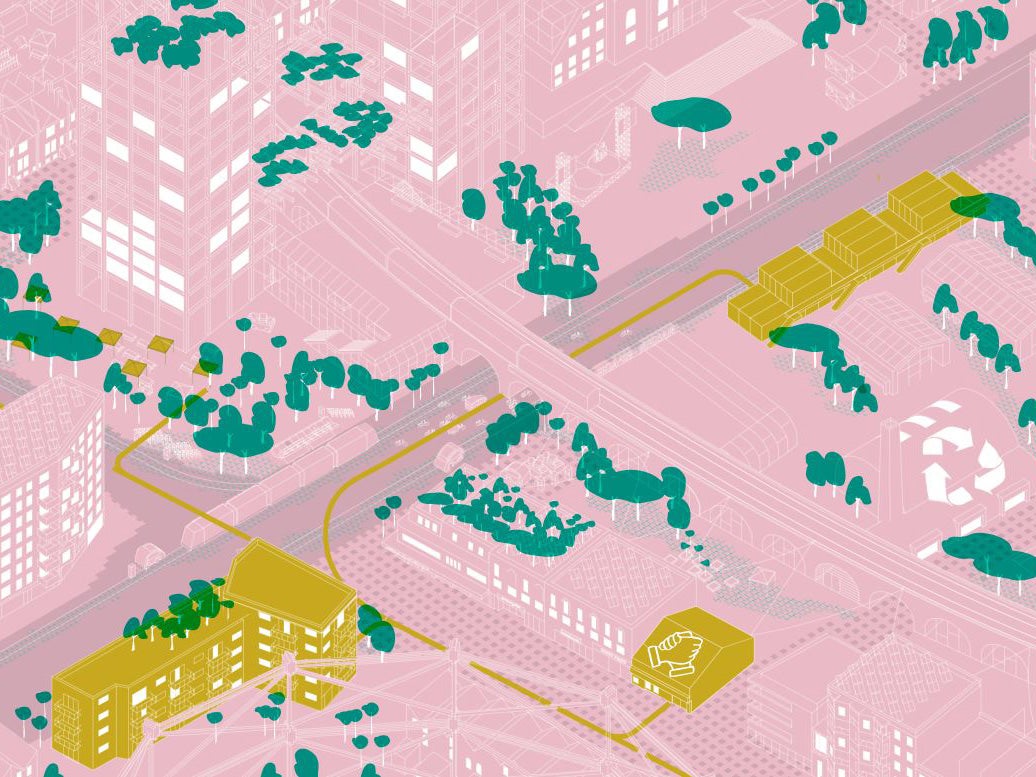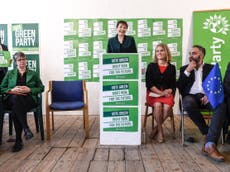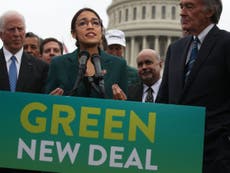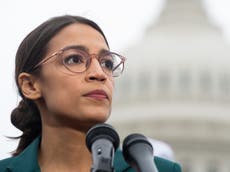We’ve all heard of a green new deal. But this is what it will actually look like
Electric bus fleets would glide smoothly across decongested streets, solar trains crisscross the country, cycling lanes weave across the town, and trams lace through the backstreets

Climate breakdown is already here, it is just unevenly distributed. From extreme weather events to rising seas, from collapsing biodiversity and soil erosion, the effects are already devastating many communities, livelihoods, and ecosystems, particularly those in the global south.
Yet unless we begin rapidly and radically decarbonising the global economy in the next decade, we all but guarantee rising temperatures and the acceleration of accelerating and interconnected forms of natural systems breakdown.
This would create and extend immense, unnecessary suffering and disruption for many and end the old assumptions - of climatic stability and benign nature - that have been the foundation of political life.
In the face of accelerating climate emergency the choice then is clear: we must rapidly and equitably transform the institutions, infrastructure, and ways of life of the carbon age in little more than a decade or face deepening climate apartheid. Tinkering won’t suffice. Marginal tweaks to an economic model driving environmental breakdown is a guarantee of deepening crisis. To thrive, only a systemic response to a systems crisis will do.
Only a shared effort of reimagining, of new world making, can radically and justly decarbonise our society in ways that deepen and universalise individual and collective freedom. Only a transformative “green new deal” - a daunting but ultimately deeply hopeful project of collective creation that restructures our economy towards sustainability and justice - can rescue our futures.
What would life be like with a green new deal? How would we live differently? Yesterday, Common Wealth, an organisation focused on designing ownership models for a democratic economy of which I’m the director, published our vision of a city of 2030 transformed by a green new deal.
It is a place of public affluence in place of private and unequal consumption, of new forms of communal luxury, from cultural spaces to civic sites to beautiful parks. Life would be more joyful, creative, and caring. Quality of life would go up even as material consumption falls.
Work in the town of 2030 is transformed, focusing on forms of nurturing, care, commoning, and creativity. A wave of democratically owned businesses - financed by an ambitious network of mission-oriented green public banks - would ensure we share in the wealth we create in common.
The inequalities of race, class, and gender that lace through fossil fuel capitalism would be challenged head-on. Community maker-spaces and local data trusts would put the means of production in peoples’ hands, creating innovative, localised supply chains. A new purpose to the economy - based on a richer, more pluralistic range of metrics than GDP growth - would help hardwire democracy, sustainability, and justice into everyday economic life.
We would work better but less. The gains of rising productivity - triggered by a wave of investment - would be recirculated into expanding leisure time. A green new deal would centre life and vitality, redistributing wealth and time to extend and universalise freedom.
A step-change in investment - underpinned by an increase in the ambition of public spending - would deliver beautiful, well-insulated, affordable homes and generously designed environments. New communities would flourish in unexpected places, with the rise of public-common partnerships reimagining how shared resources were owned and managed.
Our energy system would be decentralised, democratised and decarbonised. Renewable power - part-owned by the people of the town - would affordably power homes, green industries and create millions of rewarding jobs. Heating systems and transmission networks would be radically upgraded.
The private car would be dethroned. Electric bus fleets would glide smoothly across decongested streets, solar trains crisscross the country, cycling lanes weave across the town, and trams lace through the backstreets. A new world of green, integrated, multi-modal public transport would make low-carbon travel easy.
A green new deal would transform land use, not just in our countryside and agricultural sector. More trees would be planted, restoring green lungs to our towns and cities, and acting as a vital carbon sink.
Town halls would become the focus of civic and political life. New powers for taxation, planning, transport, skills, labour market design, and house building would equip authorities with the capacity to deliver local green new deals. Imagination, energy, and ideas thrive. A green new deal would have driven just decarbonisation through radical democratisation and decentralisation.
In the face of climate crisis, we need to reimagine our future; not just decarbonising today’s economy but building the democratic society of tomorrow. A green new deal is a plan to purposefully restructure the economy towards sustainability, better steward and repair natural systems, hardwire democracy and justice into economic and social life, reimagine and expand prosperity, build resilience, and decolonise the global economy and its everyday operations.
Driven by a step-change and expansion in public policy, investment, and democratic ownership, a UK green new deal can rescue our collective futures from climate catastrophe and create the conditions for universal human flourishing. It can start in our town of 2030.
Mathew Lawrence is the director of Common Wealth




Join our commenting forum
Join thought-provoking conversations, follow other Independent readers and see their replies